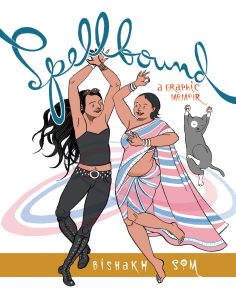Synopsis
This exquisite graphic novel memoir by a transgender artist, explores the concept of identity by inviting the reader to view the author moving through life as she would have us see her, that is, as she sees herself. Framed with a candid autobiographical narrative, this book gives us the opportunity to enter into the author’s daily life and explore her thoughts on themes of gender and sexuality, memory and urbanism, love and loss.
From: Street Noise Books
Notes on This Title
In this graphic memoir, transgender Bengali-American cartoonist Bishakh Som portrays herself as a cisgender woman named Anjali.
This memoir deals with Som losing one parent to Alzheimer’s and another to depression.
Excerpts of the graphic novel and reviews by other cartoonists can be found on Som’s website.
Awards
2020 ALA Graphic Novels and Comics Round Table Best Graphic Novels for Adults
2021 Lambda Literary Award Nominee for LGBTQ Comics
Reviews
“As an artist, Som’s architecture training is evident in exquisitely detailed, mostly four-color panels. Raw and revealing, Som’s half-century of ‘being at sea’ inspires substantial results.” (Source: Booklist)
“Bookended by two explanatory short comic strips acting as Som’s introduction and afterword to the wider realities of the book, Spellbound ostensibly follows her stand-in Anjali who has just taken a year away from her architecture career to work on a graphic novel. What follows is a meta account of the creative process as, on the page, Anjali’s wider life weaves in and out of (and around) her progress on her graphic novel. Flashbacks detail her childhood in Ethiopia with her Indian family, her school days and the eventual loss of her parents, while in the present we observe her everyday life in terms of both pivotal events – exploring her own sexuality and identity – and the minutiae of her everyday routine.” (Source: Broken Frontier)
“The book has an unpredictable, lively, and enjoyable rhythm. Gender, orientation, and identity are prominent themes: Anjali explores the possibility of romance with a longtime woman friend before beginning a promising relationship with a transgender person. Her questioning is an additional source of internal conflict throughout the book. … The art is appealing in its clean, clear style, and is rendered in beautiful colors, aided by an architect’s eye for layout, design, and details. Spellbound: A Graphic Memoir is an absorbing graphic novel that takes common struggles and examines them through an uncommon lens.” (Source: ForeWord Magazine)
“The Som who drew Spellbound works to participate in a line of semi-auto-bio queer comics that goes back at least to the 1980s (Bechdel’s Dykes to Watch Out For) and early 1990s (Leanne Franson’s still-too-little-loved Liliane: Adventures of a Bi-Dyke). She works, too, to place herself in a line of literary realist comics creators (such as Satrapi, and much of Ware). And yet Spellbound soars whenever it rises past realist constraints, and past the regular grids and Ware-ish details that come with them: in the sex scenes, in the forest, in parts of Anjali’s/Som’s childhood, where big text blocks take a holiday and Som gives us more, imagines more, to see.” (Source: The Georgia Review)
“A tricky graphic meta-memoir about levels of profound transition―personal, professional, and creative. … A rewarding narrative that presents identity as a puzzle for everyone to solve.” (Source: Kirkus Reviews)
“Som’s experimental approach to autofiction is intriguing, and her illustration and composition bring a sense of dynamism to short, diary-style chapters that coalesce into a fascinatingly complex portrait.” (Source: Library Journal)
“Often quite funny, ‘Spellbound’ is charming when it recounts, in colorful panels with black line art, Anjali’s goth-obsessed childhood, ‘old school’ Indian family and romance troubles. But it lags in the diaristic present tense — too many daily inventories of meals. The layers of identity and story in this memoir, however, and Som’s fluid approach to representing the self, feel impressively easy, unbelabored.” (Source: The New York Times Book Review)
“The narrative is also striking in the way it eschews neat resolutions for messy realism. The narrator gets ghosted by a prospective love interest following a tentatively positive date (we never do find out what happened there). She misinterprets the friendly intimacy of her best friend, and the ensuing awkwardness is palpable. She struggles with every creator’s dilemma: how many rejections do you endure before you pack it in and return to the drudgery of a desk job?” (Source: Pop Matters)
“Creative nonfiction aficionados and fans of queer comics alike will flock to this literally transformative work.” (Source: Publisher’s Weekly.)
“Using the imagined character of Anjali, Som walks us through her everyday life after quitting her job as an architect and committing herself to finishing her comic project, Apsara Engine. There is a wandering effect created by passages that start in ‘the present’ of the story and go back to the main characters childhood. And there is an emphasis on how important this process of reflection and recreation of memories are for the creator. At times, that makes it a difficult experience for the reader, but one I’d recommend nevertheless.” (Source: Sequential Artists Workshop)
Interviews
Journal of Graphic Novels and Comics: “Bishakh Som Interview”
Nerdist: “Bishakh Som Discusses the Very Personal Process of Writing Spellbound”
